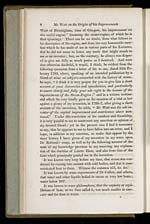James Watt (1736-1819)
History of the origin of Mr Watt's improvements on the steam-engine.
4
Mr Watt on the Origin of his Improvements
Watt of Birmingham, then of Glasgow, his improvement on
this useful engine,” (meaning the steam-engine, of which he is
then speaking). There can be no doubt, from what follows in
his description of the engine, and from the very honourable men-
tion which he has made of me in various parts of his Lectures,
that he did not mean to lessen any merit that might attach to
me as an inventor; but, on the contrary, he always was dispos-
ed to give me fully as much praise as I deserved. And were
that otherwise doubtful, it would, I think, be evident from the
following quotation from a letter of his to me, dated 13th Fe-
bruary 1783, where, speaking of an intended publication by a
friend of mine on subjects connected with the history of steam,
he says, “I think it is very proper for you to give him a short
account of your discoveries and speculations, and particularly
to assert clearly and fully your sole right to the honour of the
improvements of the Steam-Engine;” and in a written testimo-
nial which he very kindly gave on the occasion of a trial at law
against a piracy of my invention, in 1796–7, after giving a short
account of the invention, he adds, “Mr Watt was the sole in-
ventor of the capital improvement and contrivance above men-
tioned.” Under this conviction of his candour and friendship,
it is very painful to me to controvert any assertion or opinion of
my revered friend; yet in the present case I find it necessary
to say, that he appears to me to have fallen into an error, and I
hope, in addition to my assertion, to make that appear by the
short history I have given of my invention in my notes upon
Dr Robison’s essay, as well as by the following account of the
state of my knowledge previous to my receiving any explana-
tion of the doctrine of Latent Heat, and also from that of the
facts which principally guided me in the invention.
It was known very long before my time, that steam was con-
densed by coming into contact with cold bodies, and that it com-
municated heat to them. Witness the common still, &c. &c.
It was known by some experiments of Dr Cullen, and others,
that water and other liquids boiled in vacuo at very low heats;
water below 100°.
It was known to some philosophers, that the capacity or equi-
librium of heat, as we then called it, was much smaller in mer-
cury and tin than in water.


